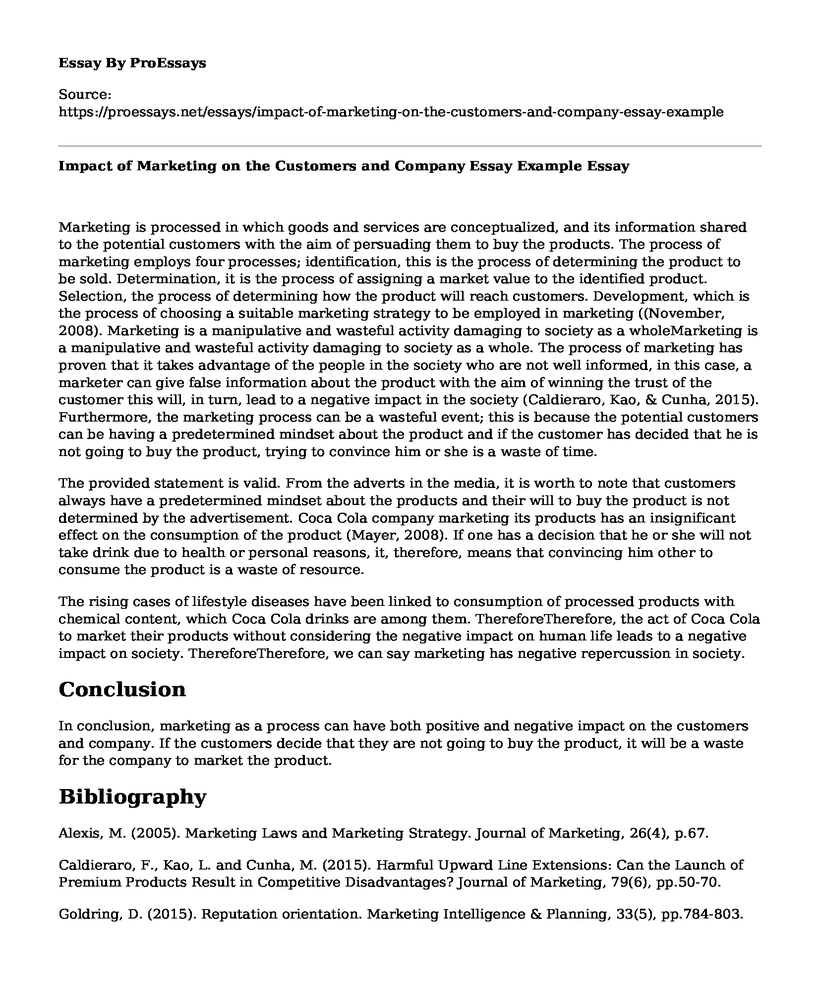Marketing is processed in which goods and services are conceptualized, and its information shared to the potential customers with the aim of persuading them to buy the products. The process of marketing employs four processes; identification, this is the process of determining the product to be sold. Determination, it is the process of assigning a market value to the identified product. Selection, the process of determining how the product will reach customers. Development, which is the process of choosing a suitable marketing strategy to be employed in marketing ((November, 2008). Marketing is a manipulative and wasteful activity damaging to society as a wholeMarketing is a manipulative and wasteful activity damaging to society as a whole. The process of marketing has proven that it takes advantage of the people in the society who are not well informed, in this case, a marketer can give false information about the product with the aim of winning the trust of the customer this will, in turn, lead to a negative impact in the society (Caldieraro, Kao, & Cunha, 2015). Furthermore, the marketing process can be a wasteful event; this is because the potential customers can be having a predetermined mindset about the product and if the customer has decided that he is not going to buy the product, trying to convince him or she is a waste of time.
The provided statement is valid. From the adverts in the media, it is worth to note that customers always have a predetermined mindset about the products and their will to buy the product is not determined by the advertisement. Coca Cola company marketing its products has an insignificant effect on the consumption of the product (Mayer, 2008). If one has a decision that he or she will not take drink due to health or personal reasons, it, therefore, means that convincing him other to consume the product is a waste of resource.
The rising cases of lifestyle diseases have been linked to consumption of processed products with chemical content, which Coca Cola drinks are among them. ThereforeTherefore, the act of Coca Cola to market their products without considering the negative impact on human life leads to a negative impact on society. ThereforeTherefore, we can say marketing has negative repercussion in society.
Conclusion
In conclusion, marketing as a process can have both positive and negative impact on the customers and company. If the customers decide that they are not going to buy the product, it will be a waste for the company to market the product.
Bibliography
Alexis, M. (2005). Marketing Laws and Marketing Strategy. Journal of Marketing, 26(4), p.67.
Caldieraro, F., Kao, L. and Cunha, M. (2015). Harmful Upward Line Extensions: Can the Launch of Premium Products Result in Competitive Disadvantages? Journal of Marketing, 79(6), pp.50-70.
Goldring, D. (2015). Reputation orientation. Marketing Intelligence & Planning, 33(5), pp.784-803.
Mayer, J. (2008). The Coca-Cola Center for Marketing Studies: A Model for Marketing Research and Education. SSRN Electronic Journal.
November, P. (2008). Marketing knowledge myopia. European Business Review, 20(5), pp.435-457.
Woodall, T. (2007). New marketing, improved marketing, apocryphal marketing. European Journal of Marketing, 41(11/12), pp.1284-1296.
Cite this page
Impact of Marketing on the Customers and Company Essay Example. (2022, Dec 12). Retrieved from https://proessays.net/essays/impact-of-marketing-on-the-customers-and-company-essay-example
If you are the original author of this essay and no longer wish to have it published on the ProEssays website, please click below to request its removal:
- Research Paper on Beauty of Imagery in Marketing and Advertising
- Ear Pod That Translates Languages Paper Example
- Essay Example on Bar Price Discrimination: Maximize Profitability & Sales
- Research Paper on Walmart: The Global Powerhouse - World's Largest Private Employer
- Gaining Compliance Through Effective Organizational Communication - Essay Sample
- Global Operations Management: Plastic Bottle Supply Chain Challenge - Essay Sample
- A Comprehensive Overview of Supply Chain Management, Stakeholder Relationships, & Technology Impact







